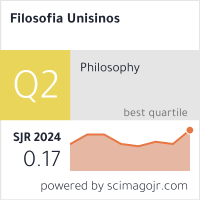Human nature between necessity and freedom
Resumen
Fragment DK 68 B 33, ascribed to Democritus of Abdera, states, “Nature and education are almost similar (he physis kai he didache paraplesion esti). For in fact education transforms human being (he didache metarhysmoi ton anthropon), and this transformation produces nature (metarhysmousa de physiopoiei).” The image of education as an activity that produces nature offered by the philosopher echoes his view of a world ruled at the same time by necessity and freedom. Necessary are the atoms and the void, the atoms’ movement in the void or the atomic compounds. The subsistence of the void in the compound bodies explains the residue of indetermination that minimizes atomistic determinism. The same structure and the same processes are repeated in the makrokosmos and the mikrokosmoi. This is a universe in permanent rearrangement (palin diakosmesis). Human beings are under the same rule: the atomic figures that configure their souls give them an even greater propensity toward transformation. In this article we examine some testimonies and fragments gathered by H. Diels in his book, Die Fragmente der Vorsokratiker that enable us to understand how Democritus saw human nature vis-à-vis freedom and necessity.
Key words: Democritus, human nature, freedom, necessity.Descargas
Métricas
Descargas
Publicado
Cómo citar
Número
Sección
Licencia
Concedo a revista Filosofia Unisinos – Unisinos Journal of Philosophy o direito de primeira publicação da versão revisada do meu artigo, licenciado sob a Licença Creative Commons Attribution 4.0 (que permite o compartilhamento do trabalho com reconhecimento da autoria e publicação inicial nesta revista).
Afirmo ainda que meu artigo não está sendo submetido a outra publicação e não foi publicado na íntegra em outro periódico e assumo total responsabilidade por sua originalidade, podendo incidir sobre mim eventuais encargos decorrentes de reivindicação, por parte de terceiros, em relação à autoria do mesmo.










